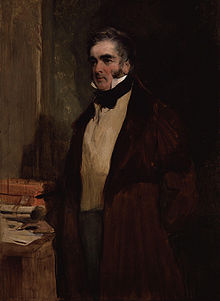Lord Melbourne
|
The Right Honourable The Viscount Melbourne PC FRS |
|
|---|---|
 |
|
| Prime Minister of the United Kingdom | |
|
In office 18 April 1835 – 30 August 1841 |
|
| Monarch |
William IV Victoria |
| Preceded by | Sir Robert Peel, Bt |
| Succeeded by | Sir Robert Peel, Bt |
|
In office 16 July 1834 – 14 November 1834 |
|
| Monarch | William IV |
| Preceded by | The Earl Grey |
| Succeeded by | The Duke of Wellington |
| Leader of the Opposition | |
|
In office 30 August 1841 – October 1842 |
|
| Monarch | Victoria |
| Prime Minister | Sir Robert Peel, Bt |
| Preceded by | Sir Robert Peel, Bt |
| Succeeded by | Lord John Russell |
|
In office 14 November 1834 – 18 April 1835 |
|
| Monarch | William IV |
| Prime Minister | Sir Robert Peel, Bt |
| Preceded by | The Duke of Wellington |
| Succeeded by | Sir Robert Peel, Bt |
| Home Secretary | |
|
In office 22 November 1830 – 16 July 1834 |
|
| Prime Minister | The Earl Grey |
| Preceded by | Sir Robert Peel, Bt |
| Succeeded by | The Viscount Duncannon |
| Chief Secretary for Ireland | |
|
In office 29 April 1827 – 21 June 1828 |
|
| Prime Minister |
George Canning The Viscount Goderich The Duke of Wellington |
| Preceded by | Henry Goulburn |
| Succeeded by | Lord Francis Leveson-Gower |
| Personal details | |
| Born |
15 March 1779 London, England |
| Died | 24 November 1848 (aged 69) Brocket Hall, Hertfordshire, England |
| Political party | Whig |
| Spouse(s) | Lady Caroline Ponsonby (m. 1805; d. 1828) |
| Children | 2 |
| Alma mater | Trinity College, Cambridge |
| Religion | Church of England |
| Signature | |
William Lamb, 2nd Viscount Melbourne, PC, FRS (15 March 1779 – 24 November 1848), usually addressed as Lord Melbourne, was a British Whig statesman who served as Home Secretary (1830–1834) and Prime Minister (1834 and 1835–1841). He is best known for his intense and successful mentoring of Queen Victoria, at ages 18–21, in the ways of politics. Historians have concluded that Melbourne does not rank high as a prime minister, for there were no great foreign wars or domestic issues to handle, he lacked major achievements, and he enunciated no grand principles. "But he was kind, honest and not self-seeking." Melbourne was dismissed by King William IV in 1834, the last British prime minister to be dismissed by a monarch.
Born in London in 1779 to an aristocratic Whig family, William Lamb was the son of The 1st Viscount Melbourne and Elizabeth, Viscountess Melbourne (1751–1818), though his paternity was questioned. He was educated at Eton and Trinity College, Cambridge, where he fell in with a group of Romantic Radicals that included Percy Bysshe Shelley and Lord Byron. Against the background of the Napoleonic Wars, Lamb served at home as captain (1803) and major (1804) in the Hertfordshire Volunteer Infantry.
...
Wikipedia
